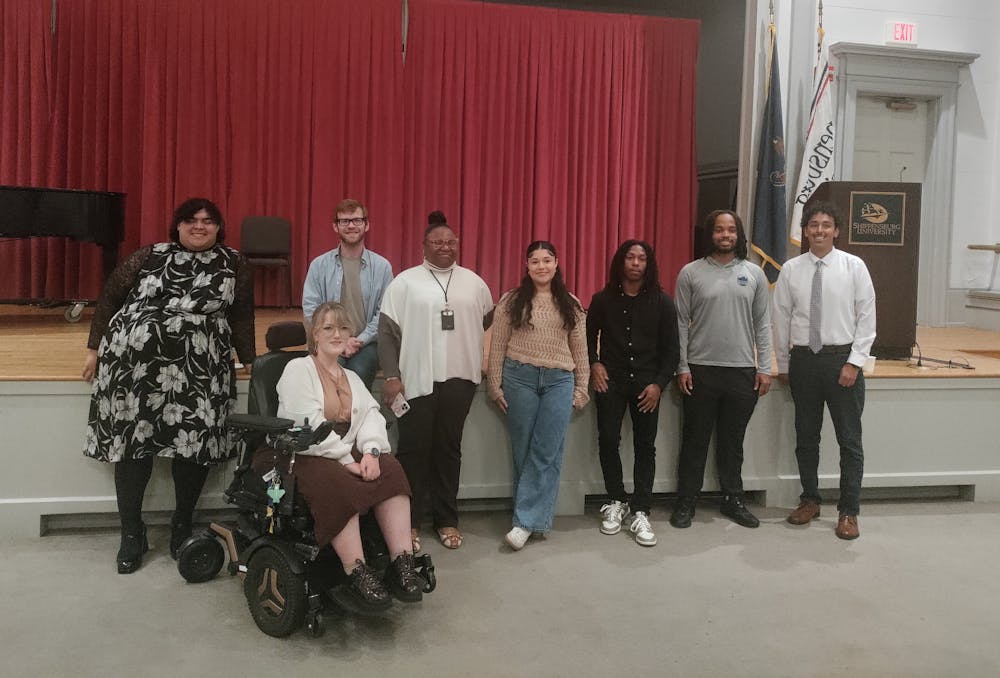A panel discussion titled “Mourning to Movement” was held in the Old Main Chapel on Tuesday, Oct. 14. The event was advertised as a vigil for justice, change and unity, and it included eight speakers from a diverse set of student organizations.
The night’s discussion was hosted by Shippensburg University’s Sociology and Anthropology Club. Opening remarks were given by the club’s president David Boatwright, co-president Jocelyn Heredia and executive board member Kennedy Holt.
According to Holt, the purpose of the discussion was to pull student leaders from across campus to share thoughts, literary pieces and poems surrounding the themes of identity, activism and intersectionality.
“Their voices, perspectives and diverse lived experiences as well as resilience provides transcendent knowledge onto our campus community,” Holt said.
Holt then introduced Kamryn Wilkerson, president of Impact Fellowship, as the first speaker of Tuesday’s discussion. Wilkerson began by bringing the audience together in remembrance of Trey Reed, a Black student at Delta State University whose hanging death is under investigation.
Wilkerson focused his speech on reciting a poem titled “Don’t Quit,” by Edgar A. Guest, which is displayed in the Multicultural Student Affairs office in Gilbert Hall.
“Every time I read it, it reminds me of the strength it takes to keep going, even when it feels heavy,” Wilkerson said. “In times like today, there are plenty of times when grief and injustice can make us feel powerless … choosing to keep going, to love, to serve and to stand for what is right, that is how we move from mourning to movement.”
Following his recital of the poem, Wilkerson urged students to turn to their communities to overcome challenges and build resilience. The microphone was then given to Disabled Students Union president Lillian Sellers, who spoke on the intersection of disability and race.
Eric Garner and Deborah Danner were among the Black disabled individuals that Sellers listed as victims of police brutality. She continued, addressing her thoughts on the separate realities faced by white disabled individuals compared to those who are Black or brown, and what steps society should take toward bridging the gap.
The next panelist to speak was Roderick Porter Jr., president of Shippensburg University’s Frederick Douglass Institute. Porter spoke on community action and how important he believes it is to actively fight against injustice and inequality. He questioned if individuals, the community and the university are doing enough to combat these issues.
He continued by addressing his concerns regarding the response to a recent incident where white supremacist pamphlets were distributed around Shippensburg.
“Where is leadership when that happens? Where are the public statements,” Porter said. “We get it when certain individuals have things happen to them, but we don’t get that when white supremacists are roaming our communities and spreading hatred. We don’t get that when a student at Delta State is possibly lynched.”
Karmen Alicea, a peer educator for the PAGE Center, discussed her perspective on realities faced by Black transgender individuals, followed by the reciting of a poem of her own titled “One a Day.”
“From Oct. 1, 2023, to Sept. 30, 2024, 350 transgender and genderqueer folks were murdered, raped, tortured and left for dead. That’s one person every 25 hours. One a day,” Alicea said, reciting the first line of her poem.
The president of the B.R.O.T.H.E.R.S. Organization, Shamere Briggs, was the next to speak. Briggs spoke about what brotherhood and unity mean to him, as well as how B.R.O.T.H.E.R.S. helped him see what opportunities are available to him.
“When I first came to Ship, I was more so around my friends who had the same kind of likeness as me. There wasn’t really much change,” he said. “But then I joined B.R.O.T.H.E.R.S., I started meeting guys who were actually doing things that struck my interest to do better in life.”
Tuesday night’s panel discussion wrapped up with closing thoughts from David Boatwright, Jocelyn Heredia and Kennedy Holt. Boatwright took time to discuss how sociologists study system injustice and violence, and how that field can inspire change.
Heredia reflected on a quote from Angela Davis that reads, “I am no longer accepting the things I cannot change, I am changing the things I cannot accept.” She spoke on how difficult it was for her to find one quote that encapsulated the thoughts of each speaker.
“We are in a moment of history where we cannot depend on those who are privileged to execute justice for us,” Heredia continued.
Porter provided further comments on the actions toward social justice that he would like to see from the university and ways students can get involved in pushing for change.
“I would love to see more consistent effort from the administration as far as speaking out against systemic attacks on higher education, hate crimes that are happening [and] foreign conflicts like what is happening in Gaza,” he said. “It would be great to have more transparency from administration about what’s actually happening in our community, not just when it’s convenient.”
On how students can get involved, Porter said, “Speak to your peers, understand where they’re coming from, don’t be afraid to have tough conversations and really be intentional about being a good human being. I think we are all old enough to know what that looks like.”
In final notes, officers of the Sociology and Anthropology Club informed the audience about a banner with a quote from Angela Davis that will be displayed in the CUB before moving to the sociology department. Audience members were encouraged to write a message that is significant to them.





The Slate welcomes thoughtful discussion on all of our stories, but please keep comments civil and on-topic. Read our full guidelines here.